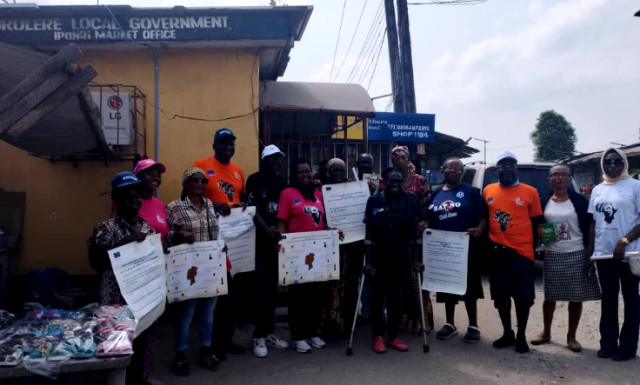LAGOS, Nigeria — A group, Rights Enforcement and Public Law Centre, REPLACE, a non-governmental organisation has embarked on a mission to address misconceptions about the Administration of Criminal Justice Law (ACJL) in Lagos State.
The group organised a campaign programme to create awareness about the law in Iponri market, Lagos state.
The campaign programme also featured people living with disabilities, who urged women to put the laws into practice.
Felicitas Aigbogun-Brai, the Executive Director of the group explained that the ACJL is often misunderstood, leading to misconceptions about its provisions and application. "We want to set the record straight and educate the public about the benefits of this law."
According to her, the initiative seeks to address misconceptions about the ACJL and equip women with tools to assert their rights, particularly in interactions with law enforcement agencies.
Aigbogun-Brai stated that the programme aims to raise awareness about the ACJL, which has been in effect since 2015 and amended in 2021.
“Despite its significance, many residents, including lawyers, are unaware of key provisions that safeguard the rights of women and vulnerable groups.”
She highlighted Section 4 of the ACJL, which prohibits the arrest of individuals in place of suspects.
“If your relative or friend is a suspect, the police have no right to arrest you. This is a crucial point we want people to understand and assert.”
Aigbogun-Brai condemned the issue of police extortion before releasing detainees.
She said, “We have simplified the laws and are providing booklets to help people understand their rights. We want them to know that they don’t have to pay for bail. Bail is free, and they should stand their ground.
"We must work together to promote justice, protect human rights, and prevent abuse of power," she added.
The Executive Director who noted that men were also educated about their rights said the campaign so far had impacted over 3,000 people, having full knowledge of their rights as provided in the ACJL.
The law contains provisions on arrest and detention, the role of the police and other law enforcement agencies, the rights of suspects and accused persons and the process for filing complaints and seeking redress.
She urged Nigerians, especially Lagosians to report cases of violation or abuse of their rights to REPLACE or legal aid council to get redress.
Earlier, the Founder of Build and Empower Children Living With Disability, Mrs Chineye Irewole, who represented people living with disabilities emphasized the importance of women knowing their rights.
She said, "People go to jail for what they didn’t do. The disabled are not left out, hence, women need to wake up and stand up for their rights as stated in the ACJL”
Mrs Tawakalitu Oshodi, a market woman who recounted her experience of bailing her daughter and sales representatives said, “When I got there, I told the police that I know my rights, and I didn’t pay anything before the girls were released to me. This only happened because I let the police know that I know my rights.”
A police inspector who spoke with Rocketparrot New on condition of anonymity endorsed the full implementation of the law.
He emphasized that the ACJL aims to promote efficient and effective administration of justice, protect human rights, and prevent abuse of power. "This law is designed to ensure that justice is served, and the rights of all citizens are protected," he said.
Stakeholders at the campaign engaged in a lively discussion, asking questions and sharing their experiences. REPLACE provided clarity on the ACJL's provisions and application, dispelling misconceptions and promoting a better understanding of the law.




















